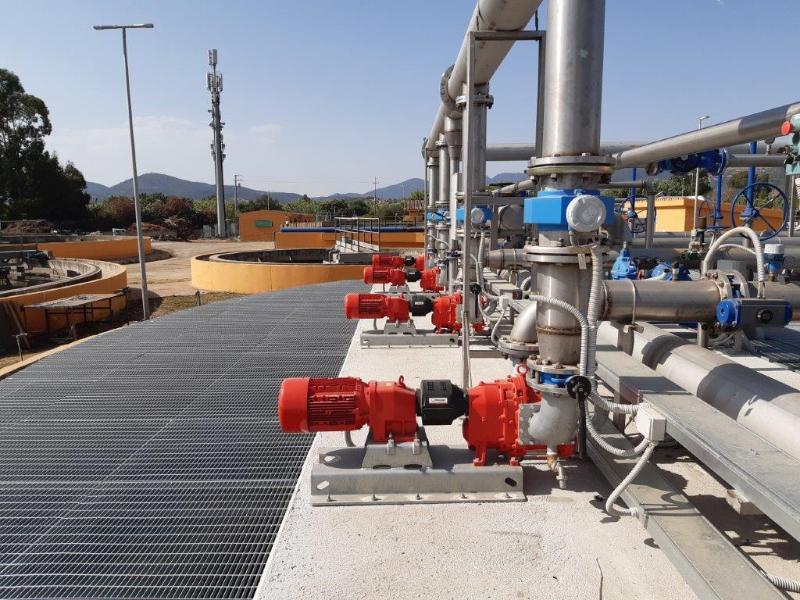In Sardinia, water is precious. Italian utility Abbanoa is working on a major investment to eliminate waste and make better use of the island’s resources as it confronts the devastating reality of climate change
By Peter Koh and Chiara Robotti.
Water is precious on Sardinia, an Italian island experiencing the effects of climate change first-hand. The island, the second largest in the Mediterranean, is seeing less and less rain, which in combination with rising sea levels, threatens the availability of fresh water. Worse, in the summer of 2021, wildfires ravaged 20 000 hectares, forcing more than 1 500 residents to flee and destroying nearly 90% of the olive groves in the municipality of Cuglieri. Even the famed one thousand-year-old wild olive tree of Sa Tanca Manna was severely damaged. Fixing the island’s leaking water pipes, which lose around 60% of the water that passes through them, is therefore a top priority for Sardinia’s main water company, Abbanoa.
“Water is a vital element, a common good that we must not take for granted, but we must protect it and manage it in the best possible way,” says Antonio Mulas, financial manager at Abbanoa.
Since 2018 the company has been working on an ambitious investment plan to reduce the amount of water lost through its pipes and reservoirs. But cutting water loss is not simply about replacing old pipes. The higher the pressure in the distribution network, the more water is lost through bursts or leakages. Pipes sometimes also burst because of pressure fluctuations, which cause the pipes to expand and contract.
Abbanoa’s multi-year investment plan aims to identify and solve the main causes of inefficiency, as well as detecting leaks. In Oliena, a village of 7 000 inhabitants that served as a pilot project, new control valves helped reduce its 70% water losses by more than half. By halving the minimum level of flows at night, the energy efficiency of the water network was also greatly improved. This approach has since been extended to 100 other municipalities in Sardinia, including Dorgali and Orsei, where water losses have been cut by 44% and 53% respectively.
Digital technologies have also been deployed to monitor the entire water distribution network, supported by detailed hydraulic analysis, pressure management and air control. Smart, digital water meters, which provide a more efficient and transparent billing and administration service, have also been rolled out to 300 000 consumers, up from around 100 000 in 2018.

A new water purifier in San Teodoro, Sardinia courtesy of Abbanoa.
Abbanoa aims to replace all old meters with smart metering technology that can measure consumption more efficiently and accurately and allow consumers to monitor their energy use almost in real time.
The company’s investments, which cover the entire water cycle, is also expected to benefit Sardinia’s agriculture and tourism industries by using treated, purified wastewater for crops and the irrigation of municipal green areas, which reduces the volume of wastewater released into the sea. Treated wastewater will soon be reused to irrigate urban parks in Cagliari, the island’s capital. 95% of sewage sludge is already being reused for agriculture.
Some of the at least €400 million in works planned, however, have been hit by delays related to the COVID-19 pandemic. “If you work on the water network, you have to interrupt the water supply,” explains Mulas. “So we prioritised the continuity of the service during the pandemic lockdowns, when people were at home and needed water.”
To finance its plans, Abbanoa turned to the European Investment Bank, signing a loan of up to €200 million in 2019, with the backing of a guarantee from the European Fund for Strategic Investments. The EU’s Structural and Infrastructure Funds are also contributing to the costs of the project. “This was a great opportunity to engage a new client on a sizeable climate change-related project in a cohesion region,” says Alessandro Ronzoni, a European Investment Bank loan officer. “The level of leakages was an outlier compared to the sector and the rest of Italy, so we felt that our loan could have a meaningful impact on the company, sector and region.”
The EU bank’s financing filled an important gap for Abbanoa and came at a good time.
“The loan has given us some peace of mind and comfort even during the pandemic,” says Abbanoa’s Mulas. “Thanks to the loan, we could start this big project, as we had the resources to plan wisely. The loan has been the solution to our problems in the medium term. We shifted from a logic of ad hoc intervention to a planned service. Citizens who had faced critical issues in water supply, no longer face them.”